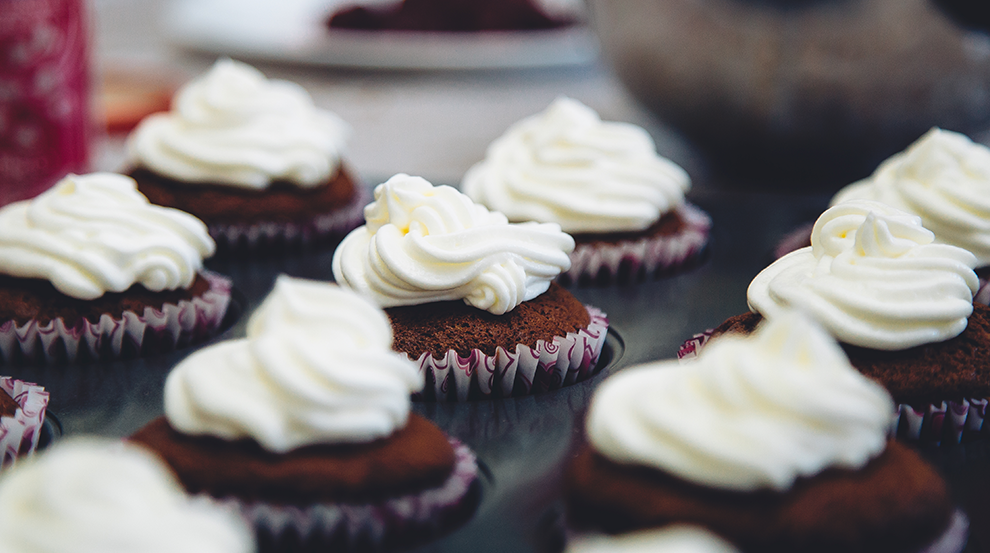The Great British Bake Off vs the Presidential Cookie Poll: who comes up trumps?
The 12 contestants about to duel by sourdoughs and shortbreads in series seven of The Great British Bake Off have now been unveiled by the BBC. Given the show’s phenomenal success – some 13m viewers tuned in to the season finale in 2015, making it the most-watched show of the year – levels of cake-related excitement in the UK are running high.
But in the preamble to the new season of Bake Off, starting on August 24, you might have missed another notable piece of baking news, this time from the other side of the Atlantic. Observing an American electoral ritual inaugurated in 1992, voting has opened in the Presidential Cookie Poll, pitting Melania Trump’s star cookies against Hillary and Bill Clinton’s chocolate chip offerings.
The temptation, perhaps, is to dismiss these two competitions as mere soufflés, affording the cultural analyst no nutrition. But this would be a mistake. Just as “the purchase of a sponge cake” was a matter of profound interest to Jane Austen, so the contemporary making of baguettes, biscuits and brioches is ripe with intellectual possibilities. Nestling beneath the glaze of a pie is not only an enticing filling for immediate consumption but an array of social meanings to ponder.
National identities, not just competitors’ scores, are up for grabs in baking contests such as the Presidential Cookie Poll and The Great British Bake Off. One way of grasping the issues at stake is to review the troubled history of attempts to clone Bake Off for the American market.
Incompatible ingredients
In 2013, under the title of The American Baking Competition, CBS attempted to re-purpose Bake Off for the US. Multiple elements of the British original were transposed, including the three-challenge format. Paul Hollywood, one of the two judges of the UK series, was also imported. But the show refused to rise. Having begun with the worst-rated Wednesday evening premiere in CBS’s history, the series struggled for an audience, making its recommissioning inconceivable.
Various explanations have been offered for the show’s failure. One centres upon the naked ambition exhibited by the contestants. In the UK, an engraved cake stand is awarded to the victor of Bake Off; the winner of The American Baking Competition, meanwhile, received $250,000, plus a book contract. Unsurprisingly, then, the US competition was barbed.
Yet we should be cautious about distinguishing hobbyist British baking from a thoroughly capitalistic American counterpart, since to remove Bake Off itself from the realm of economics would be naïve. Not only has the show proved highly exportable to overseas markets, boosting the BBC’s entrepreneurial credentials, it also offers significant commercial opportunities to winners and runners-up. Nadiya Hussain, last year’s winner, exemplifies this most spectacularly, having earned numerous TV, magazine and newspaper deals since her victory in 2015.
The failure of The American Baking Competition is more attributable to queasily incompatible ingredients. Gentility was combined with abrasion, kindness with cutthroat competition. The effect was one of situating Downton Abbey in an American cityscape.
Comparable mistakes were made in 2015 when ABC tried to replicate Bake Off. This time Mary Berry was involved, paired with a US chef to judge The Great Holiday Baking Show. Copying of the original was even more slavish, extending to use of the same English setting. Again, however, viewing figures were poor. The deficiency, once more, was incomplete anglicisation. The Great Holiday Baking Show also suffered from the fact that, from 2014, PBS had begun to screen Bake Off itself to American audiences, making any ersatz substitutes superfluous.

Back in Britain … BBC
Baking the nation
The terms in which Bake Off itself has been received in the US imply a sense of Britain as unchanging, picturesque, pleasingly quaint. Writing in The Atlantic on the Great Holiday Baking Show, Sophie Gilbert argued: “baking is nostalgia, baking is home, baking is a warm, cinnamon-scented sense of security”. But while true, this is only a partial insight. Bake Off reveals that baking is many other things as well, including money.
Conversely, the series actually contests a nostalgic Britishness. Geographers David Bell and Gill Valentine have argued that “the food which we think of as characterising a particular place always tells stories of movement and mixing”. These “stories” are brought to the fore in Bake Off by contestants’ recipes from multiple cuisines: Ugne’s Lithuanian honeycake in 2015, for example, or Alvin’s Filipino-inspired jelly bar. With the new series set to feature culinary influences from Cyprus to Ghana, it can confidently be expected not to amount to The Great Brexit Bake Off.
But such open embrace of multiculturalism in baking is not apparent in current choices for the Presidential Cookie Poll. The Clintons adopt a conservative, even nativist stance by choosing America’s favourite cookie. And while Melania Trump’s use of sour cream hints at her Slovenian origins, she remains careful not to overstate non-US influences.
So the America conjured up by the cookie contest is, in fact, more traditional than the Britain of Bake Off. If the poll’s regressive gender politics have eased slightly from its initial iteration as the First Lady Cookie Bake-Off, the sense of nostalgia lingers. The Cookie Poll – along with the prevailing American response to Bake Off itself – fantasises about an older, artisanal world, failing to acknowledge that baking can also teach us about modernity and change.
![]()
Andrew Dix, Lecturer in American Studies, School of the Arts, English and Drama, Loughborough University
This article was originally published on The Conversation. Read the original article.

